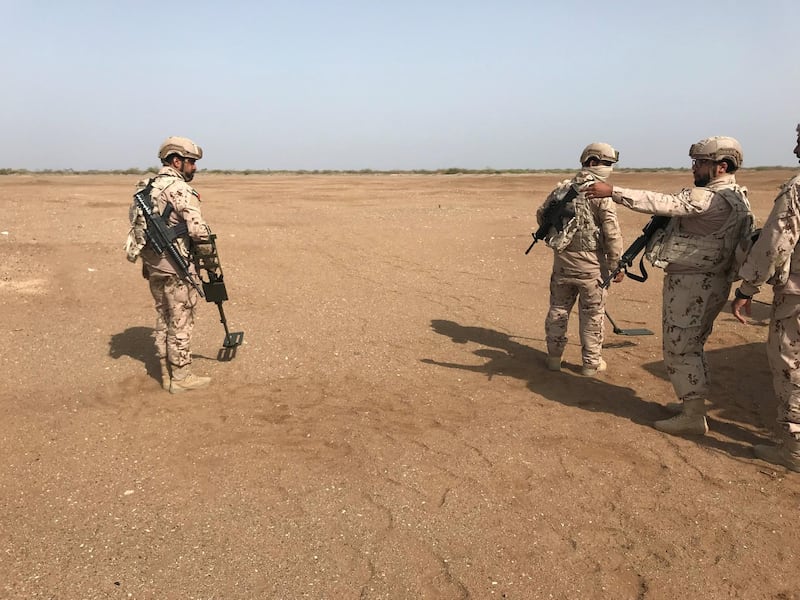Yasser Yassin was driving along a road on Yemen's rugged Red Sea coast when a blast sent his Toyota Hilux flying into the air.
When he regained consciousness, the 30-year-old merchant realised he could not move his right leg or see with his right eye.
Mr Yassin's car had hit an anti-tank mine, one of thousands laid by Houthi fighters three months earlier before they were driven out of Khoukha area of Hodeidah province by pro-government forces backed by the Saudi-led military coalition.
His recovery has been far from straightforward, despite help from the military coalition whose leading members are Saudi Arabia and the UAE.
"They [the coalition] took me to Aden where they fixed my leg, but there was an issue with the metal prosthesis and my leg got infected," Mr Yassin said, leaning on his crutches during a visit to Al Mokha hospital for a follow-up after the blast in February.
Yemen has been devastated by three years of conflict in which President Abdrabu Mansur Hadi’s government, backed by the coalition, is fighting to drive the Iran-backed Houthi rebels out of cities they seized in 2014 and 2015.
_______________
Read more:
[ Yemeni street artist portrays human cost of war ]
[ Yemenis across Houthi-held Sanaa protest against gas shortage ]
[ Yemeni army seizes control of last Houthi-held position in Nehim ]
_______________
The results of the Houthis' use of banned anti-personnel mines can be seen in the hallways of the hospital in Al Mokha town, located not far north of the strategic Bab Al Mandeb strait, which were crowded with victims and visitors.
Doctors and medical staff made their way between armed men to provide first aid to patients wounded by landmines, as well as by shrapnel and mortars.
"I was walking with my brother, I stepped on a mine and it went off," said Rashida, a 13-year-old girl fitted with a rudimentary prosthetic leg.
Her father said she had never attended school because the closest one to their village in Taez province was 30 kilometres away and had closed down after the Houthis invaded Taez.
Residents and medics from Mokha and nearby villages said landmines had caused more casualties than the fighting in the area, which has seen the Houthis pushed out of some Red Sea coastal areas since 2016.
The explosives were buried randomly across the region, they said, including in residential areas, playgrounds and under trees where many Yemenis traditionally sit to chew leaves of qat, a mild narcotic.
It is not clear how many people have been killed by the landmines, but two doctors and a government official said dozens had died just in the coastal areas of Mokha, Khoukha and Haiys since Houthi forces started withdrawing in early 2017.
The UAE armed forces and Yemeni troops said they harvest between 250 and 300 mines every week in the western region. More than 40,000 devices have been neutralised since coalition-allied forces took control of the Red Sea coast in a series of battles starting in 2016.
About 90 per cent of the landmines were locally made and most of the victims are civilians, they said.
"They also have Russian-made landmines which they took from government warehouses when they invaded the capital Sanaa," said an expert in explosives in the UAE armed forces.
The UAE has been arming, training and paying thousands of fighters from southern provinces, called the Southern Resistance, to capture western coastal areas and push the Houthi armed movement back to their homeland in the north.
The war is entering its fourth year this month and, despite Houthi losses in parts of western Yemen, they still control Yemen’s most populated areas, including the capital Sanaa.
Last year, Human Right Watch called on the Houthis to cease using landmines and observe the 1997 Ottawa Convention ban on anti-personnel mines, which took effect in 1999. Yemen signed the treaty in 1998.
"Most of the victims who survived lost one or two of their legs, and many are crippled and cannot do any physical work,” said Ghassan Massoudi, director of Al Mokha hospital. He said the military wing of the hospital was treating also civilian landmine victims.
That side of the facility gets most of the attention from the internationally recognised government and the Saudi-led coalition, as it treats fighters from the front lines in Al Garahi district 90km away where the Southern Resistance and allies from fellow coalition member Sudan face mortar bombs and heaving shelling from the Houthi side.
Mr Yassin said the coalition would not pay for his trip to India – where many Yemenis seek medical treatment – when he needed new surgery on his leg and eye, as he was not a fighter.
So he paid his own way.
"I sold the remains of the car, my mother and wife's gold and went to India where I spent $8,500 [Dh31,000]. I still lost my eye," he said.





